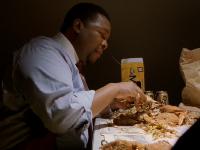They are what they eat
 I’ve been on an old movie binge for the past couple of months, but after trying and failing to make it all the way through “The Third Man” and “Some Like It Hot” over Labor Day weekend, I decided to give Cinema Appreciation a break for while. Instead, I queued up season two of The Wire, a police drama set in Baltimore.
I’ve been on an old movie binge for the past couple of months, but after trying and failing to make it all the way through “The Third Man” and “Some Like It Hot” over Labor Day weekend, I decided to give Cinema Appreciation a break for while. Instead, I queued up season two of The Wire, a police drama set in Baltimore.
I think that when there’s a scene in a screenplay that involves food, the writer might as well wave a big red flag and yell, “Character development!” Why else would anyone ever film one? Food scenes are messy and hard to coordinate, and it’s almost impossible for anyone to look good while they’re eating. But because of the intimacy and specificity of food, it’s a great way to establish a character or add context.
The second episode of the The Wire is titled “Collateral Damage,” but it might as well be called, “What’s to Eat?” Early on, two of the main police characters share a meal in an interrogation room. Once partners and still friends, McNulty and Bunk gnaw their way through a mess of crabs that McNulty caught while on duty in a patrol boat. Seafood is expensive, but if you have access and knowledge you can harvest your own, and the meal is sloppy, unpretentious, and obviously delicious. The shells are strewn in piles across a table covered with newspaper, washing up against a rack of cheap beer in cans. McNulty is the founder of the feast, and it’s at least partially an apology for having recently added to Bunk’s responsibilities. Bump is both fastidious and a connoisseur of carnal pleasures. At one point he corrals a crab body and, after razzing McNulty for letting it go to waste, dips his paw into the shell and dispatches a handful of guts, unselfconsciously licking his fingers clean. The entire process is quick, neat, and something that only Bunk could make look graceful.
The next food scene is set in the prison cell of a drug kingpin caught and sentenced at the end of the first season. When one of his foot soldiers visits from another part of the prison, Avon Barksdale offers him food from a spread of Kentucky Fried Chicken. The message is clear: Avon is in control and plans to stay that way. He has the contacts and money to make his stay at least slightly more comfortable. And, even though he has been sentenced to seven years in prison, he intends to find ways to shorten that time, and he is determined to live his life as normally as possible.
In the last food scene in the episode, we catch up with members of the stevedore union at their favorite bar at 9am after a spectacular booze-up the previous night. The dock workers huddle around the bar, nursing hangovers until one man shows up with a carton of eggs. The men crack raw eggs into glasses of beer and then gulp the mess down: breakfast and the hair of the dog in one go. This, we gather, is how they live — hanging on from paycheck to paycheck while the port dies around them.



